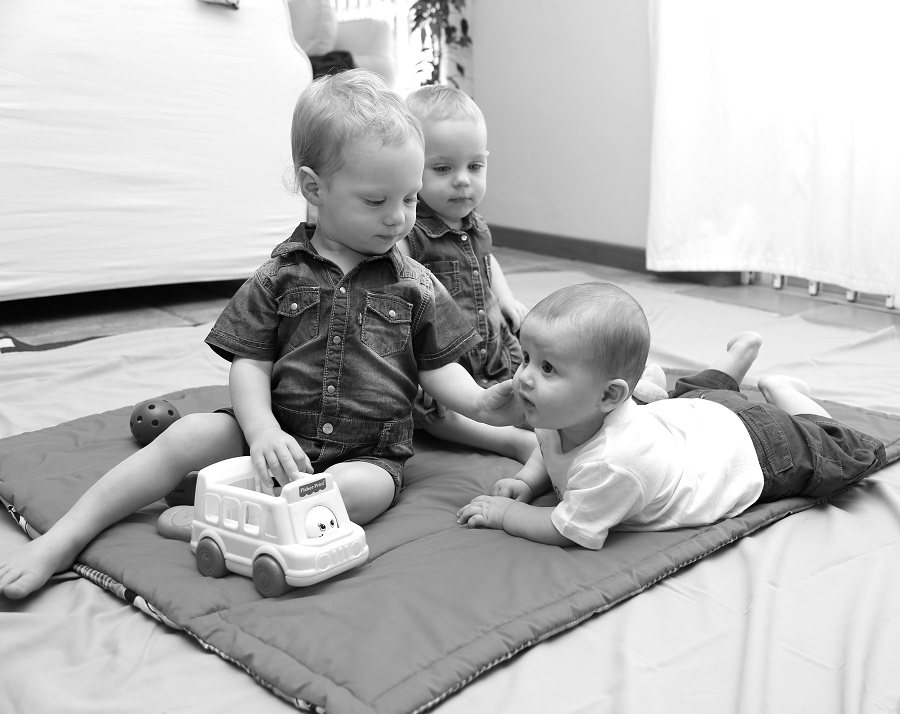
It is said that sibling rivalry is the best form of contraception. – Unknown
It usually takes two to fight. If one picks a fight and the other doesn’t respond, there will be no fight. However, if one starts and the other reacts, we refer to it as a fight.
Ultimately children need to learn to fight their own battles, but they first have to be shown how to do this constructively before they can be left to handle it themselves. Otherwise it becomes survival of the fittest. The extrovert becomes the attacker and the introvert the victim.
- Usually what happens is that the extrovert is the obvious, loud, attention-seeking one that gets into trouble all the time.
- The introvert, however, is the one that looks for trouble behind the scenes. His favourite saying when confronted is usually, ‘I was only playing’ or ‘I didn’t do anything’. Try to recognise when this happens.
- They could be the instigators who quietly take something away, tease, irritate, ignore.
- Then when the extrovert reacts, they protest and the ‘culprit’ is punished.
I was shopping one day and saw a little scene play out a few metres from where I was. A mom was busy chatting to a friend while a boy and girl of about three or four were standing, waiting not so patiently in the empty trolley. I was concerned that they would fall out, so I kept a watchful eye. They, of course, started getting bored, so – as children do – they made up their own entertainment. The little girl pushed the little boy and he pushed back. This was repeated a few times till they became bored again. The little girl gave a final hard blow to the boy and he landed in a sitting position. Although he didn’t really get hurt, he let out – no, pushed out – a fake cry. The girl could see what was about to happen and quickly offered him her hand and said, ‘Bite me!’ Of course he made use of this opportunity and bit her. She very cleverly let out a loud cry and screamed, ‘Mommy, he bit me!’ while proudly displaying the evidence.
You will not always know what happened behind the scenes – who started, who responded, etc. It is an exercise of futility to try and get to the bottom of everything.
Here are some suggested alternatives:
- If each one has a different story to tell, you could send them both to the same room and tell them to discuss what happened and only come out when their stories are the same.
- ‘Blow the whistle’. When they hear this whistle, it means they are not allowed to say what the other one did wrong, they are ONLY allowed to say what THEY did wrong. If they ’cannot remember’ or ‘didn’t do ANYTHING!’ then remind them that they have one more chance to ‘remember’ or ‘admit’. If they plead the fifth amendment and remain silent, then the sibling will have an opportunity to share and if he/she has facts to incriminate, his/her brother will have to endure double consequences.
They will start learning that when mom ‘blows the whistle’, both will have to face consequences, e.g.:
- The sibling who was hurt can be served by the other one for a day.
- Let them try to sort it out by themselves. When you are happy that their attitudes towards each other are respectful, you can leave them to sort it out by themselves.
- This way, they won’t have consequences and they will learn to pick their battles. Once the truth is out, you can decide on the consequences to be meted out according to their age, their temperament and their contribution – not who started it! You may simply require them to apologise.
- This way they will learn that if they don’t sort it out themselves, mom or dad will get involved and they will both be held responsible for their contribution. However, if one starts and the other defuses, there is either no punishment or only punishment for the one who persisted.
- Talk them through conflict resolution, modelling what you would like them to immolate. Do this a few times, then leave them to handle it themselves. But make sure you are listening around the corner, until you are confident they understand, then leave them to it.
Children appreciate justice more than equality. Something can be just without being fair. Friction between siblings can be a result of:
- one subtly being preferred above the other,
- one getting away with murder (usually the teasing introvert),
- looking for attention,
- boredom,
- both being treated the same, (no pecking order)
- injustice,
- no consequences – so it works for them
- a way to get the parents angry, or
- a way to get the parents to side with one or the other sibling.
Tattle-taling
When you have one that becomes the news presenter, try to not let it work for him. This could also be the friend who comes to play.
- Explain the rule that tattling is only allowed for three reasons: when someone is being hurt, when it is dangerous or when property is being destroyed or damaged.
- Give two or three vouchers and explain that these can be exchanged for a valid ’telling on …’. When the vouchers are used up, no more tattling! Ask if they are REALLY sure they want to use that voucher this time?
- Have them repeat the ‘complaint’ in front of the others (because often it includes something this tattle-tale has done and he is hoping to get the others into trouble by coming to tell first!)
- Have her find five nice things to say about him.
When friends come to play the golden rule is: ‘If you can’t be nice to your sibling, the friend goes home. Friends come and go, family is there for life!’
This does not mean that the younger sibling has to stick around all the time. That would cause sibling rivalry! It means that the older one can allocate an amount of time to include the sibling and then respectfully request that the sibling leave after the allotted time. If they refuse, there could be a consequence. If the older one has not been respectful, he could receive a consequence.
The friends also have to treat the siblings with respect. That means no name-calling or being mean. If the older sibling does not address this, then you could step in and say something like, ‘Frank, in this house we don’t speak to each other like that. Can you please apologise to her and then ask her nicely to leave the room?’ Next time, I can assure you, your child will prefer to handle it and not leave it till you appear.





